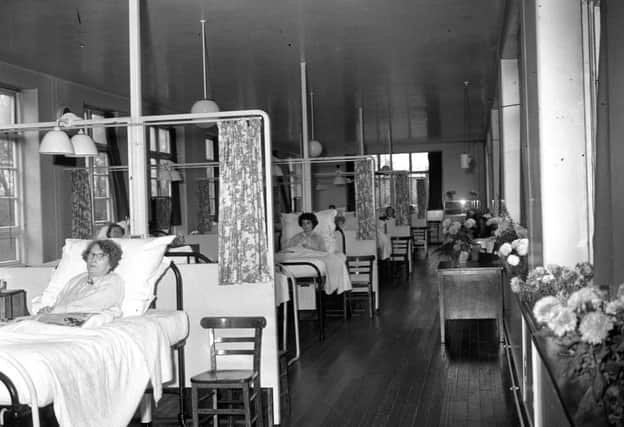PC rescuer deserved a medal


Yesterday, I told how auxiliary fireman George Walter Lyall Renwick lost his life trying to rescue the crew of the Heinkel after one of the mines it was carrying exploded in Bents Park, killing nine men.
Today we pay tribute to a young policeman who also paid the ultimate sacrifice during the incident which happened on February 16, 1941.
Advertisement
Hide AdAdvertisement
Hide AdPolice constable PC 57 Leslie Lamb was just 23 when the bomber, part of a 129-plane raid on the North East, came down and burst into flames.
And like other rescuers that day, he risked his own life to try to save four enemy airmen (a fifth, believed to be the pilot had earlier bailed out, but struck trolley bus wires and later died in hospital of his injuries) who were trapped inside.
His sister-in-law Mrs Mary Lamb, says the young PC, who she believes was in charge of the rescue operation, deserves a medal for his selfless act of bravery.
“He was trying to get the crew out of the bomber,” explains Mrs Lamb, who lives in Hebburn.
Advertisement
Hide AdAdvertisement
Hide Ad“He had a fire hose, but they had to wait many minutes before they went in to rescue them. When he did go in, the plane (caused by one of the mines) exploded.”
Mrs Lamb, who still gets upset at the thought of the tragedy, said her husband Dennis, was just 13 when his brother was killed.
“It was a big shock to his mam (Elizabeth Ellen) and his dad (Edwin).”
PC Lamb’s funeral was held at St Cuthbert’s Church, in Hebburn, and was conducted by the Reverend RS Troop.
Advertisement
Hide AdAdvertisement
Hide AdA plaque commemorating his death was originally on display in the old Keppel Street police station. Thanks to the efforts of Mr and Mrs Lamb a replica plaque now hangs in the Millbank police station.
Eighty-two-year-old Mrs Lamb said a further plaque is situated at Newcastle Crematorium, while PC Lamb’s name is included on a roll of honour at Westminster Cathedral.
Yet despite the fact that the gallant policeman – who is described as being “a lovely lad” – died trying to save the enemy, Mrs Lamb says she is not bitter.
“As a policeman, he was just doing his duty like everyone else that day.
Advertisement
Hide AdAdvertisement
Hide Ad“The Germans were human beings. There are no winners in war,” she added.
Also killed that day were leading fireman Albert G Purvis and fireman John Wharton along with the plane’s crew Ogefr. Wilhelm Beetz, Hptm Heinz Strya, Uffz Karl-Gunther Brutzsam, Uffz Helmut Herbert Jeckstadt and Gefr Franz Janeschit .
l Meanwhile, Mrs Kathleen Hill said her father who was seriously hurt in the blast, and given the last rites, ended up in the same hospital ward as the young German pilot after he and his colleagues had desperately tried to rescue the airman and his fellow crew members from the blazing plane
Ferdinand Kennedy, who was better known as Fred, was a policeman at the time of the crash.
Advertisement
Hide AdAdvertisement
Hide AdMrs Hill, who lives in Boldon Colliery, said her father was originally employed as a boot-boy before joining the Royal Flying Corps (after giving a false age) and serving in Egypt.
When he returned home he married a South Shields girl called Margaret and joined the police force.
The young policeman and his family lived in Oak Avenue, Cleadon, before moving to Seafield Terrace, opposite the park gates, in South Shields.
There he was called out more or less every night during the war years.
Advertisement
Hide AdAdvertisement
Hide AdAnd it was on one such a call-out that Mr Kennedy (who by then had become a sergeant) was injured attending the bomber crash in Bents Park.
Although, by this time, Mrs Hill had been evacuated, she later found out about her father’s “lucky escape”.
“I was told that he had been called out that night when the mine on board, which nobody knew about, exploded.
“He woke up in the park lake which didn’t have any water in it at the time.
Advertisement
Hide AdAdvertisement
Hide Ad“His great coat, which we had for a long time before giving it to the police for their museum, ended up looking as if someone had cut it off from the waist down.”
Mrs Hill said her father’s injuries were so serious that he was given the last rites by a priest in the Ingham Infirmary where he was being treated.
“ He was taken to hospital and was given the last rites, he was so badly injured.
“He mentioned later on that he had been on the same ward as the young German pilot who had been calling out for his mother before he died.
Advertisement
Hide AdAdvertisement
Hide Ad“My father was very lucky to survive. A long time afterwards he used to scratch his neck and out would come bits of shrapnel.”
After his accident, Sgt Kennedy was given an office job, one of the responsibilities of which was being in charge of the local police messenger service (or PAMs as it was known) which employed young lads below Army age to carry messages for the police force.
When Mr Kennedy retired from the police force, he had been promoted to the rank of acting inspector.
l There will be more memories of the plane crash and its terrible aftermath on Thursday.